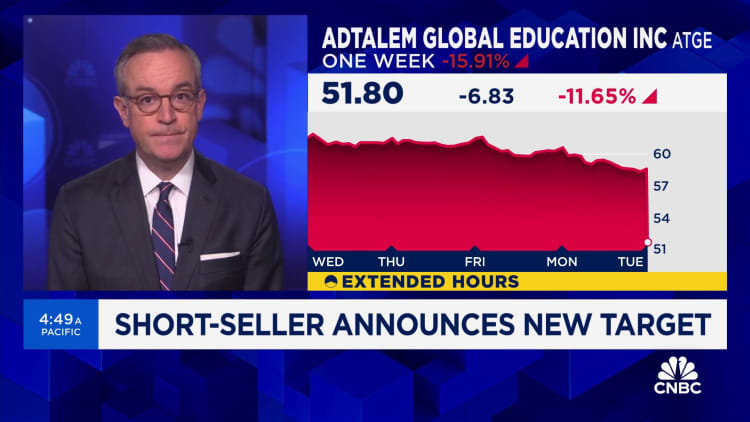
WASHINGTON — Short seller Fahmi Quadir has found her new target: The $2 billion market cap Adtalem Global Education, a publicly traded, for-profit education company that operates institutions including online college Walden University, the nursing school Chamberlain University and Ross University School of Medicine in Barbados.
In a new report exclusively obtained by CNBC, Quadir’s firm, Safkhet Capital, writes that Adtalem is “a toxic byproduct of an imperfect higher education system.”
Quadir told CNBC she has a short position in the stock, meaning she is betting that the share price will decline. Her report is expected to be released Tuesday.
Quadir, 33, became a financial industry celebrity in 2018 after a prominent role in the Netflix documentary “Dirty Money.” The show’s third episode focused on the fate of the pharmaceutical company Valeant, which Quadir correctly predicted. Her track record of shorting companies has earned her the nickname “The Assassin.”
“We believe that Adtalem is completely uninvestable, the number of existential risks that exists today should cause alarm for any investor that’s looking into this company,” Quadir said.
She predicts that the company is wasting federal tax dollars on programs that are ineffective, and that it faces several significant financial threats. And she points out that more than 70% of Adtalem’s revenue comes from federal student aid dollars.
Rafael Henrique | Lightrocket | Getty Images
“It makes me mad, and I feel that everyone should be angry that our money is being abused in such a careless, careless kind of way,” Quadir said. “And what do the executives of these for-profit universities do? Well, they pay themselves very well, and they also buy back plenty of their stock.”
She also believes that the schools in Adtalem’s portfolio are pushing untenable debt loads onto many students.
“These are hardworking students – they worked hard for their degrees,” she said. “They paid a lot for their degrees. But they tell me that there is no way over the course of their lifetime that they can pay off their loans, even if they are making diligent payments every month, sometimes to the tune of thousands of dollars a month.”
While Adtalem may not be a household name, it is a successor to DeVry, the for-profit education company whose ads were ubiquitous on television in the 1980s and 90s. DeVry went public in 1991, becoming the first education provider to hold an initial public offering.
In 2017, DeVry Education changed its DV ticker symbol to Adtalem’s current ATGE, completing the rebranding of DeVry into Adtalem. The following year, the company transferred DeVry University to Cogswell Education LLC.
Quadir’s report found that among Adtalem’s properties, the online college Walden University has a graduation rate of just 29%. The nursing school Chamberlain University has a graduation rate of 40%.
In a statement, a spokesperson for Adtalem said, “As a leading healthcare educator, and as an organization with more than 300,000 alumni, Adtalem provides quality educational programs that aim to prepare our students for gainful employment and are a good return on investment for both our students and U.S. taxpayers.”
The spokesperson also noted that the graduation rates include a population of full and part time students who are earning their degree while working full time.
“These students may need more time to complete their degree than the 8-year scorecard cutoff, however, we are committed to ensuring all students are workforce ready when they graduate,” the company said.
Adtalem’s stock price has soared over 75% in just seven months, from just over $33 a share in late June, to more than $60 a share at Monday’s open. The company’s shares are widely held by institutional investors, including Blackrock and Vanguard.
Quadir’s criticisms are focused on several key areas of the company’s financials.
She says Adtalem has not disclosed that its unit Walden University is the target of an investigation by the Department of Education into its doctoral programs, citing a public record posted in November by the company’s accreditor, the Higher Learning Commission.
That document says the commission “has assigned a Governmental Investigation designation to Walden University in Minneapolis, Minnesota, based on an investigation initiated by the U.S. Department of Education related to the institution’s doctoral programs.”
Quadir points out that the company’s “financial responsibility composite score” was lowered by the federal Department of Education in September to a rating of 0.2, which she argues could force the company to seek out additional letters of credit in order to continue to receive federal student loan funds.
A spokesperson for the Department of Education did not respond to a CNBC inquiry about its financial policies.
Quadir also points out that the Biden Administration is reinstating something called the “gainful employment rule” in July of this year, which rates student outcomes by earnings and debt load.
Safkhet Capital’s report predicts that many of the company’s programs will fail to meet the Department of Education’s threshold metrics for preparing students to achieve gainful employment.
According to the department, programs that “fail to meet the standards on the same metric twice in a three-year period will not be eligible to participate in the Department’s Federal student aid programs.”
“From the data we have today, for these programs, we’ve estimated that they will fail.” Quadir said. “And there’s really little that the company can do.”
Quadir also questions the company’s accounting for the assets of Walden University, particularly how it values the school’s eligibility to receive federal student loan dollars. According to Adtalem, Walden’s “Title IV eligibility and accreditations” is an “intangible asset” worth $496 million, as of Sept. 30, 2023.
Quadir is scheduled to detail her short position in a speech Tuesday in Miami at a conference organized by the Managed Funds Association.
A spokesperson for Adtalem responded to each of the points raised by Quadir.
The company noted that the Department of Education’s investigation into Walden University’s doctoral programs, “does not accuse Walden of any wrongdoing,” and the company “is fully cooperating with the Department’s request” for information.
Adtalem also said it expects “the vast majority” of its programs will pass the Biden Administration’s gainful employment rule. “If a program is unable to meet [gainful employment] standards, we will have an opportunity to make adjustments in order to maintain Title IV eligibility.”
As for the accounting of Walden’s intangible assets, the company said: “Because Walden University is an online educational institution, it has few physical locations. As a result, a large portion of the purchase price is attributed to intangible assets. We are confident in the accuracy of this attribution and as a publicly traded company, Adtalem is audited by Pricewaterhouse Coopers.”
Read More: World News | Entertainment News | Celeb News
CNBC







